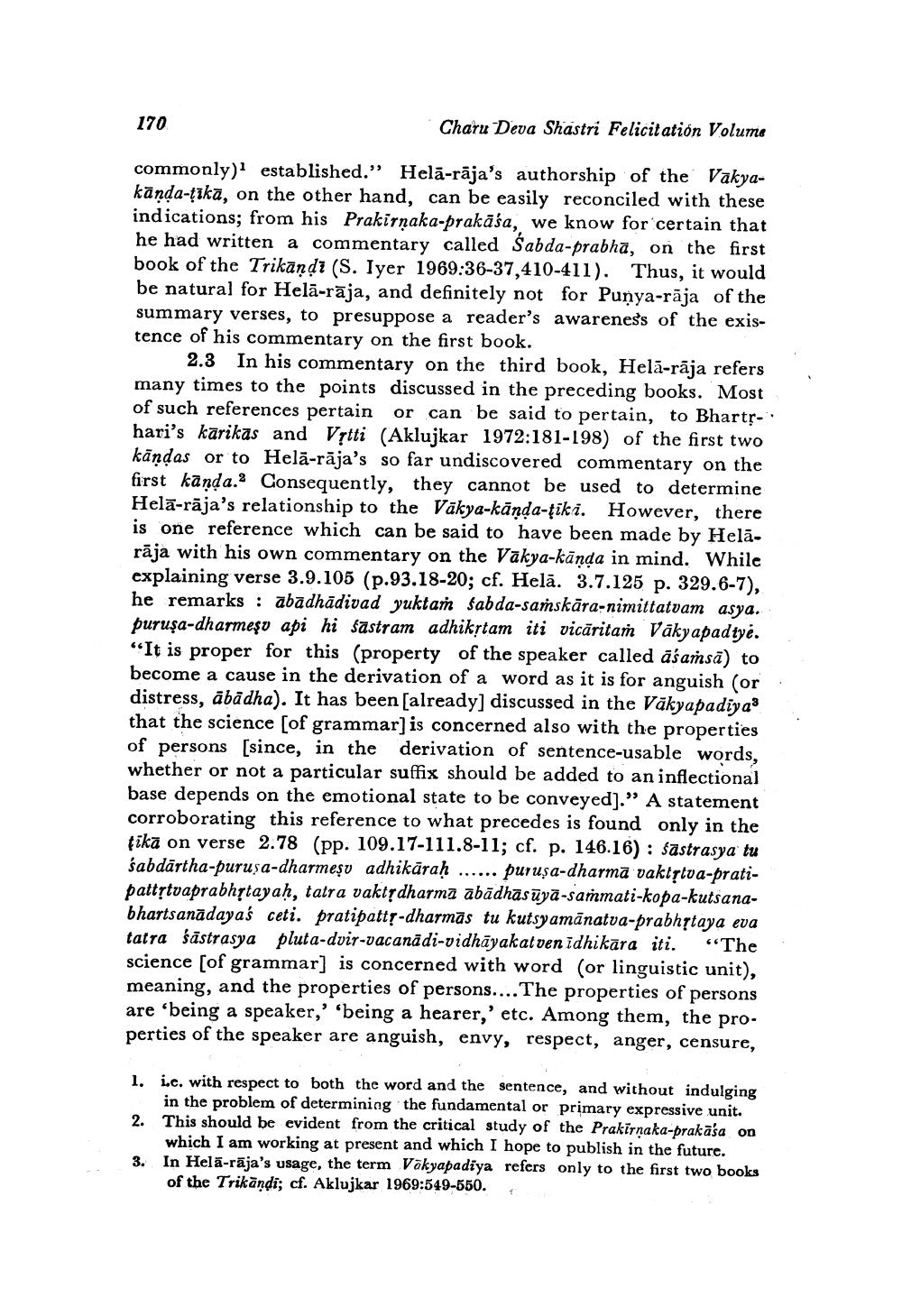Book Title: Authorship Of Vakya Kanda Tika Author(s): Ashok Aklujkar Publisher: Ashok Aklujkar View full book textPage 6
________________ 170 Charu Deva Shastri Felicitation Volume commonly)' established.” Helā-rāja's authorship of the Vakyakānda-ţikā, on the other hand, can be easily reconciled with these indications; from his Prakirnaka-prakāśa, we know for certain that he had written a commentary called Sabda-prabha, on the first book of the Trikāndi (S. Iyer 1969:36-37,410-411). Thus, it would be natural for Helā-rāja, and definitely not for Punya-rāja of the summary verses, to presuppose a reader's awareness of the existence of his commentary on the first book. 2.3 In his commentary on the third book, Helā-rāja refers many times to the points discussed in the preceding books. Most of such references pertain or can be said to pertain, to Bhartshari's kārikas and Vịtti (Aklujkar 1972:181-198) of the first two kāndas or to Helā-rāja's so far undiscovered commentary on the first kända. Consequently, they cannot be used to determine Helā-rāja's relationship to the Vakya-kānda-ţiki. However, there is one reference which can be said to have been made by Helā. rāja with his own commentary on the Vakya-kānda in mind. While explaining verse 3.9.105 (p.93.18-20; cf. Helā. 3.7.125 p. 329.6-7), he remarks : abadhādivad yuktan sabda-saṁskāra-nimittatvam asya. puruşa-dharmeşu api hi śāstram adhikstam iti vicāritam Vākyapadtyé. “It is proper for this (property of the speaker called āśaṁsā) to become a cause in the derivation of a word as it is for anguish (or distress, ābādha). It has been (already] discussed in the Vākyapadiya that the science (of grammar) is concerned also with the properties of persons [since, in the derivation of sentence-usable words, whether or not a particular suffix should be added to an inflectional base depends on the emotional state to be conveyed]." A statement corroborating this reference to what precedes is found only in the fika on verse 2.78 (pp. 109.17-111.8-11; cf. p. 146.16): Sastrasya tu śabdārtha-puruşa-dharmeşv adhikāraḥ ...... puruşa-dharmā vaktstva-pratipattstvaprabhstayaḥ, tatra vaktsdharma abādhasāyā-sammati-kopa-kutsanabhartsanādayaś ceti. pratipatt-dharmās tu kutsyamānatva-prabhịtaya eva tatra śāstrasya pluta-dvir-vacanādi-vidhāyakatven idhikāra iti. “The science (of grammar] is concerned with word (or linguistic unit), meaning, and the properties of persons.... The properties of persons are being a speaker,' 'being a hearer,' etc. Among them, the properties of the speaker are anguish, envy, respect, anger, censure, 1. i.c. with respect to both the word and the sentence, and without indulging in the problem of determining the fundamental or primary expressive unit. 2. This should be evident from the critical study of the Prakirnaka-prakāśa on which I am working at present and which I hope to publish in the future. 3. In Helā-räja's usage, the term Vökyapadiya refers only to the first two books of the Trikāndi; cf. Aklujkar 1969:549-550.Page Navigation
1 ... 4 5 6 7 8 9 10 11 12 13 14 15 16 17 18 19 20 21 22 23 24
